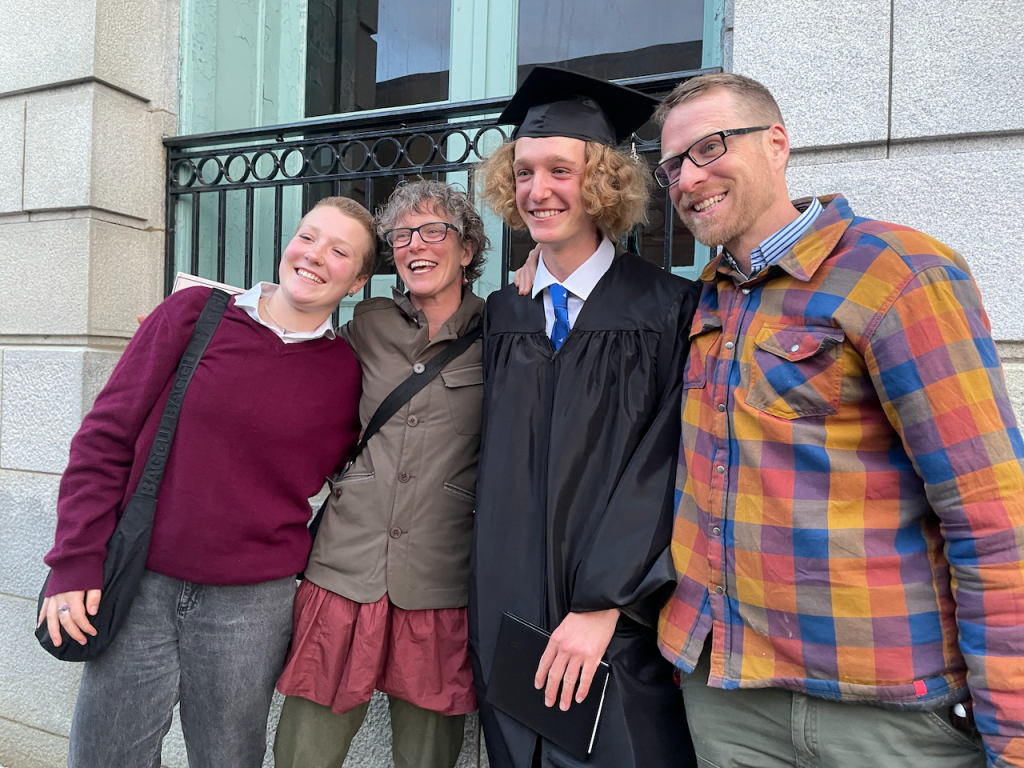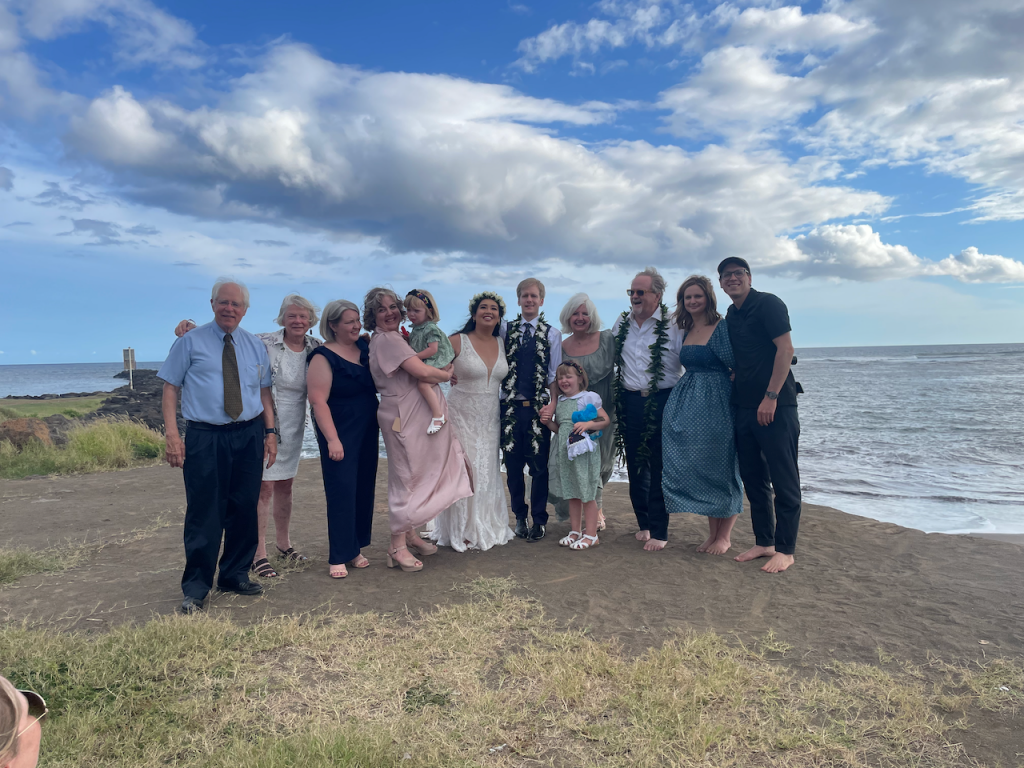Why write about a high school graduation? They are all pretty much the same, right?
Not at Casco Bay High School in Portland ME.
Our daughter, Jessica, and her husband, Peter, have two children who attend this extraordinary public school. Jo has just completed her freshman year, and Jasper graduated two weeks ago. The Ellis family moved to Portland four years ago. Their reason for moving from Mt Rainer, MD was due in part to their kids getting into this school.
Embry and I arrived from our Hawaii wedding trip in time to attend the awards ceremony the day before graduation. The graduates wore their caps and gowns and were seated in several rows facing the audience of parents and friends. There are only about 100 students in the graduating class—very small for a public high school. And the students are quite diverse. The school uses the lottery system to assure that the student population matches the Portland population according to several categories including class, race, and income. Forty-four percent are minority students, and forty percent will be the first in their family to go to college. About the same percentage are from “economically disadvantaged” families.
I can’t remember what all the awards were—I counted 38 presentations in all with many students receiving multiple awards. (Jasper was tied for the most awards, five, along with several other students.) But what I will remember for a long time were the roars of approval and cheers that erupted from the class when the winner of each award was announced and the hugs and high fives among students once the ceremony was over.
My goodness, I thought, these kids really love each other. What is going on? How many diverse public high schools in the U.S. are you going to find with this kind of camaraderie and bonding? How many schools of any type—public or private?
I think the philosophy behind the school plays a big role. Casco Bay High School is what is called an “expeditionary learning school.” There are about 150 such schools in the U.S., which are based on the philosophy of a German educational visionary, Kurt Hahn, who also founded Outward Bound. By design the schools are small, and their approach emphasizes empathy, respect, hands-on experience, cooperation, teamwork, exploration of the natural world, and a host of other similar concepts including diversity and inclusion. On day one of your freshman year, you are assigned to be in one of the six or seven “crews” where you will remain a member with 14 or 15 other students and a faculty crew leader for all four years. Each crew reflects the diversity of the student body. The crews meet often throughout the year and together go on adventures such as camping, kayaking, canoeing, travel, mountain climbing, and hiking. While nothing is ever perfect and it is true that there are often conflicts within families and close groups, it seemed to me that a lot of these students over the four years had bonded as brothers and sisters.
It would be hard to top the awards ceremony, but the graduation event the next day came close. Each 14-member crew sat together on the stage of the downtown Portland performing arts theater, which was almost full. Three things stood out. The first were the short “speeches” of four or five words that every student made before they lined up to accept their diplomas. Cheering from the audience was so loud that I had a hard time hearing what was said, but I got the gist. The second were the diploma presentations. Polite handshakes with the principal were replaced by embraces, and as graduating seniors approached the principal, who was awarding the diplomas, there were several back flips, numerous cool dancing moves, and three or four graduates who crawled or “alligatored” to receive their diplomas. Decorum quickly morphed into raucous joy and borderline chaos.
What impressed me most, however, were the PowerPoint-like slides that appeared on a large screen behind the students as they received their diplomas. The first image included their name and where they were going to college (or for some taking a gap year). The second image was a short paragraph describing why this person was special. Each description was thoughtful, often amusing, and always positive and affirming. There were no cliches or ho-hum descriptions. A lot of thought had gone into each one. Crews were responsible for preparing the comments about their fellow members though I suspect the faculty crew team leader was the person who pulled the comments together.
I could not help noting that only a handful are going to a prestige college or university. Almost half are going to the local community college (probably because it is free), several to the local college, the University of Southern Maine, and more to the University of Maine. Not a single student was going to an Ivy League School, and only about 10-15 percent were going out of state. Why not more? These students seemed fabulous to me, and Casco Bay has the reputation of being academically rigorous.
I compare this with the experience of both of our children who attended private—and, yes, elite—prep schools in Washington where in both schools it seemed to me that about half the graduating students were going to Ivy League or other highly selective colleges. Andrew went to Penn and Jessica to Brown. Certainly, while these are great high schools, the students couldn’t be all that much better than the Casco Bay students, could they?
Getting selected by admissions committee at highly selective colleges when applying from a public high school seems a heavier lift compared to the prep schools—even from excellent and academically rigorous schools like Casco Bay. There is also the issue of cost and affordability by working class families. I know that this issue has been the focus of higher education reform initiatives aimed at leveling the playing field (and that these efforts are the focus of pushback). Still, it seems to me there is a ways to go.
But then again, as Embry pointed out to me, there is way too much emphasis on the benefits of so called “elite” colleges and universities, much of which falls into the category of educational snobbishness, a charge which I have to admit, sadly, that I am guilty of. One could argue that you can get a good if not better education at schools which are not “highly selective.” And they are right. It all depends on the teachers you have, the philosophy of the school, and what each person puts into the experience. What is important in our world today, however, is to get that college degree.
And in that regard Casco Bay High School has succeeded big time. Every single student graduated this year, and every single student got into college. The school has opened up a world of opportunity for many who otherwise might have fallen through the cracks at a conventional high school.

The Ellis family–Jo, Jes, Jasper, and Peter
(Our grandson, Jasper, is going to a great school, the University of British Columbia, which is listed among the top 60 universities in the world, though it is not well known or considered “elite” by most people in the U.S.)
The other thing that made this graduation special was that the Casco Bay High School Class of 2023 was “the covid class.” Because of the pandemic, the school closed in early 2020, requiring the students to take classes online for 18 months. All the graduating classes of 2023 all over the planet Earth have been through a lot. They have good reason to celebrate at graduation time.
Over the weekend, Jessica, turned to me and asked, “Now, Dad, do you understand why we moved to Maine and now do you understand why it was the right choice?”
I nodded yes.
